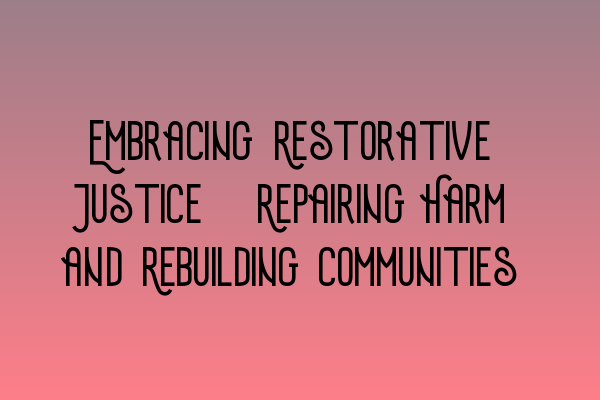Embracing Restorative Justice: Repairing Harm and Rebuilding Communities
At SQE Criminal Law & Practice Law UK, we believe in embracing restorative justice as a powerful approach to resolving conflicts and repairing harm within our communities. Restorative justice focuses on the needs of victims, offenders, and the community, and offers a transformative alternative to traditional punitive measures.
What is Restorative Justice?
Restorative justice is a process that brings together those who have been harmed by a crime or conflict with those responsible for the harm. It aims to address the harm caused, provide an opportunity for dialogue, and enable active participation in finding meaningful resolutions.
By shifting the focus from punishment to healing and repair, restorative justice allows individuals to take responsibility for their actions, gain understanding, and make amends to the victims and the community. This approach acknowledges that crime is not only a violation of laws but also a breach of relationships and trust.
The Benefits of Restorative Justice
Restorative justice offers a range of benefits for all parties involved:
- Victims have a chance to express their feelings, ask questions, and have a voice in the resolution process.
- Offenders are encouraged to take responsibility for their actions, learn from their mistakes, and develop empathy towards those they have harmed.
- Communities are actively involved in addressing the harm caused and finding ways to prevent further incidents.
By focusing on repairing harm rather than exacting revenge, restorative justice promotes healing and growth. It aims to reduce recidivism rates by addressing the underlying causes of criminal behavior and empowering individuals to make positive changes in their lives.
Implementing Restorative Justice
To effectively implement restorative justice practices, it is crucial to provide comprehensive training to all stakeholders involved, including victims, offenders, community members, and justice professionals.
At SQE Criminal Law & Practice Law UK, we offer SQE 2 preparation courses designed to equip legal professionals with the knowledge and skills necessary to understand and implement restorative justice principles. Our courses cover a wide range of topics, including mediation techniques, victim-offender dialogues, and community conferencing.
If you are preparing for the SQE 1 exam, we also provide SQE 1 practice exam questions and SQE 1 practice mocks FLK1 FLK2 to help you assess your knowledge and enhance your understanding of criminal law and practice.
For information on upcoming SRA SQE exam dates, please visit our page dedicated to providing the latest updates regarding examination schedules.
Conclusion
Restorative justice offers a transformative approach to addressing crime, repairing harm, and rebuilding communities. By embracing this powerful alternative, we can foster empathy, accountability, and healing, ultimately creating safer and more resilient societies.
If you are interested in learning more about restorative justice or preparing for the SQE exams, visit our website for SQE 1 and SQE 2 preparation courses, SQE 1 practice exam questions, and SQE 1 practice mocks FLK1 FLK2.
